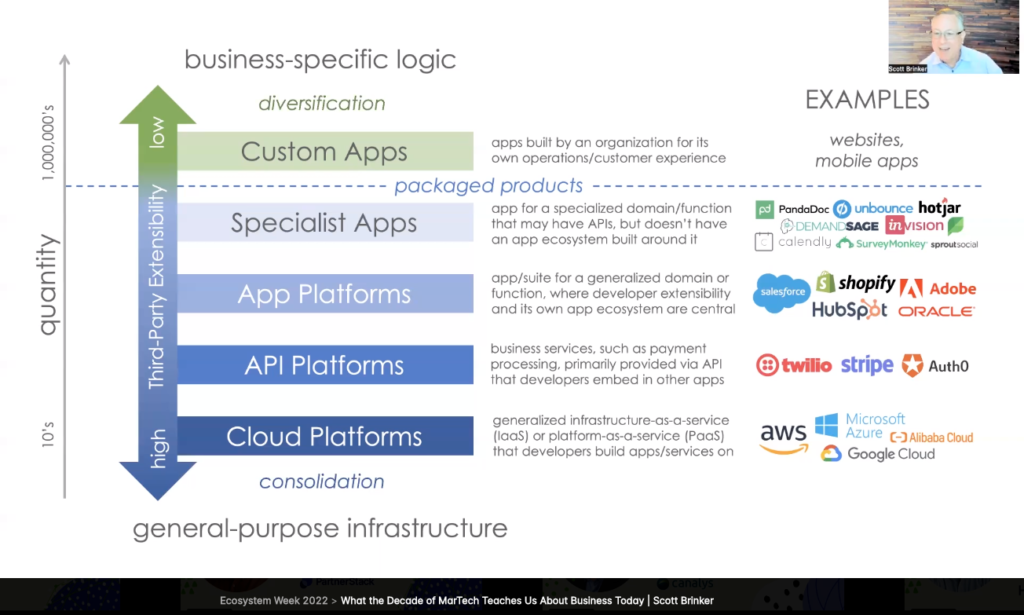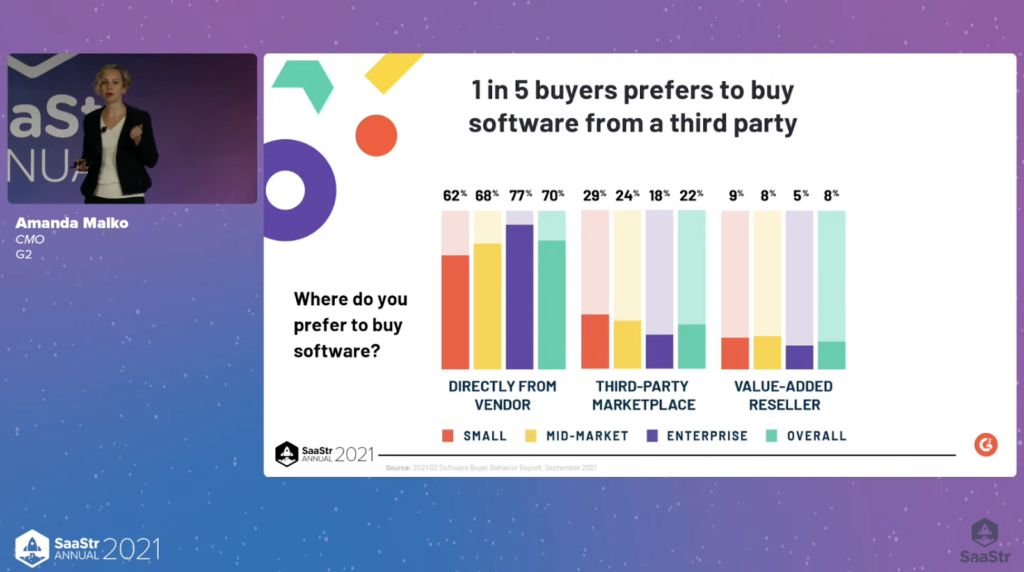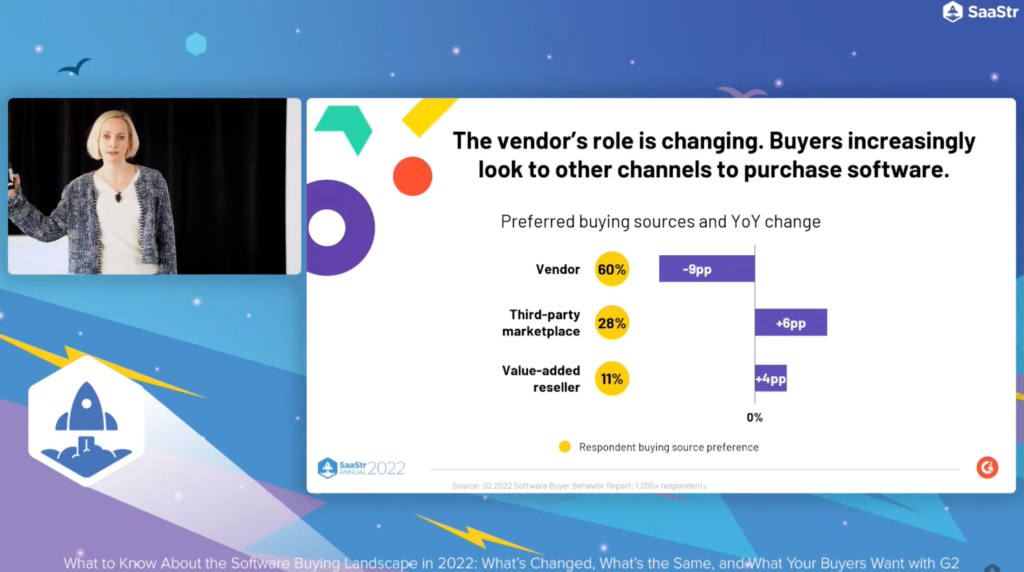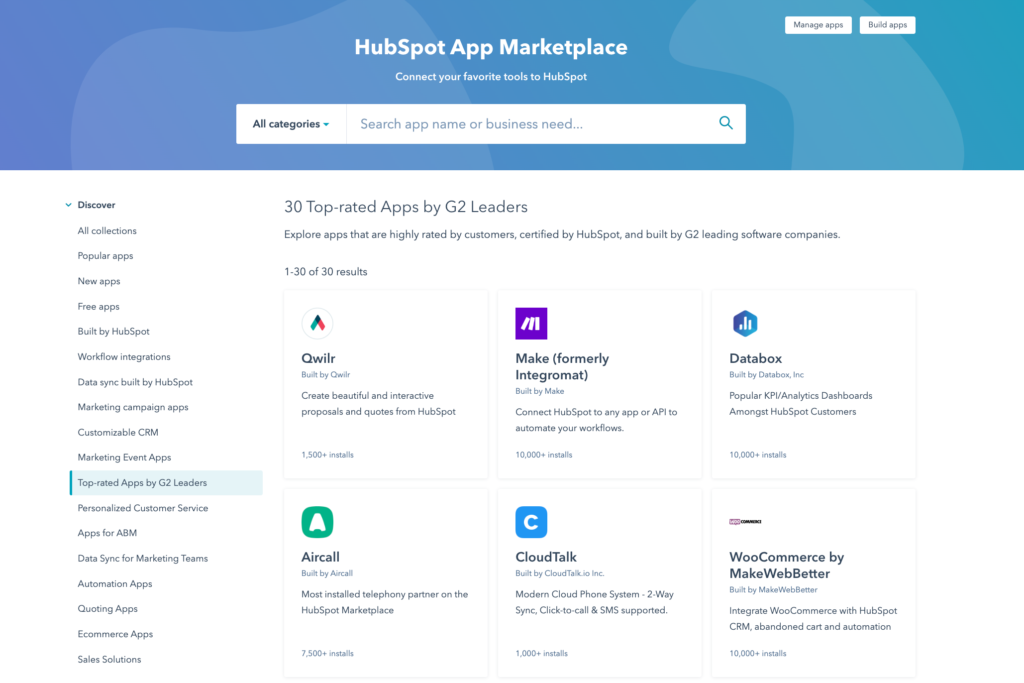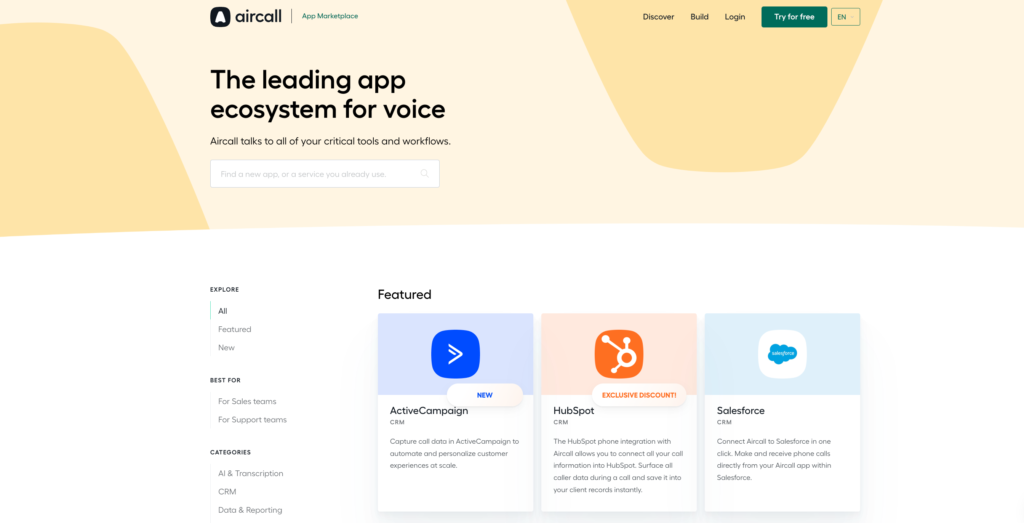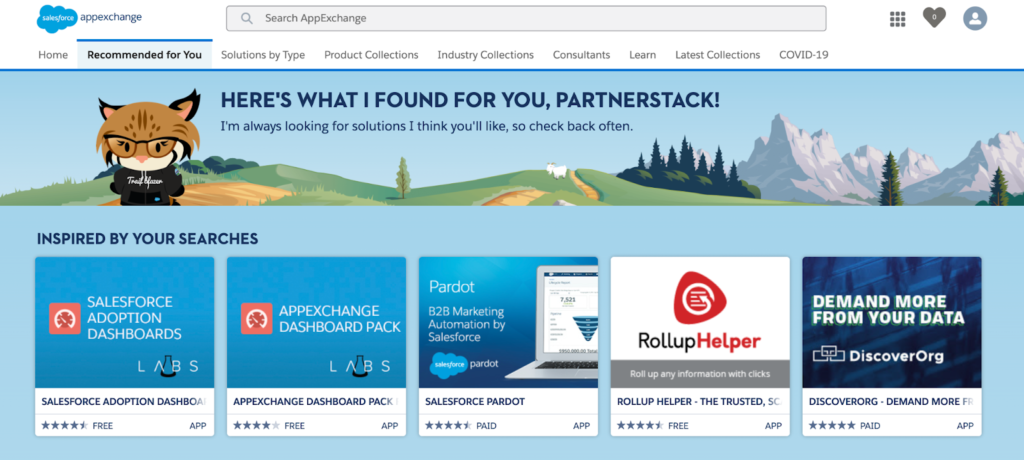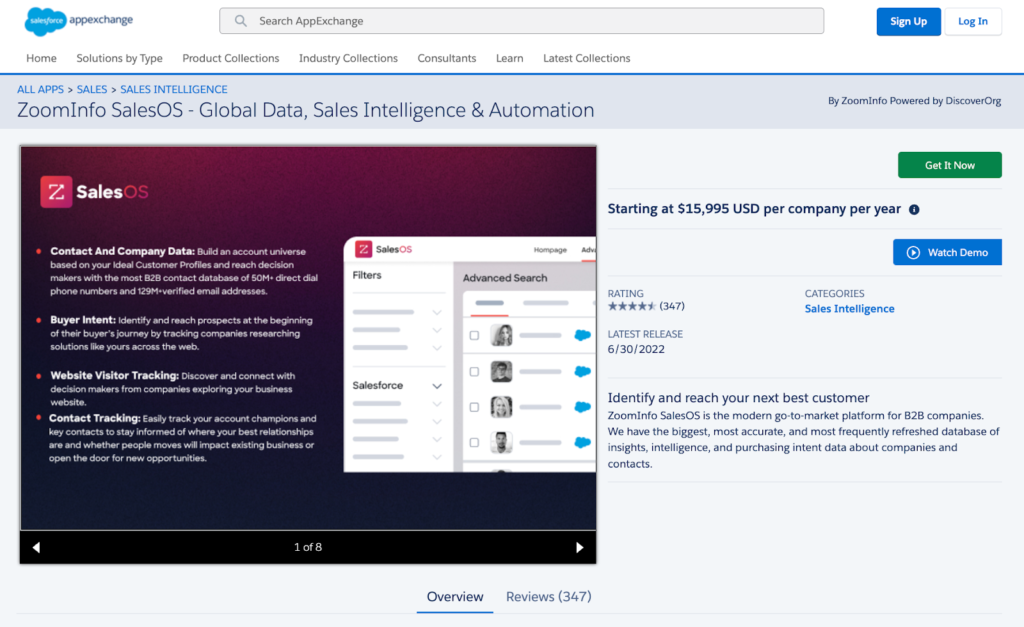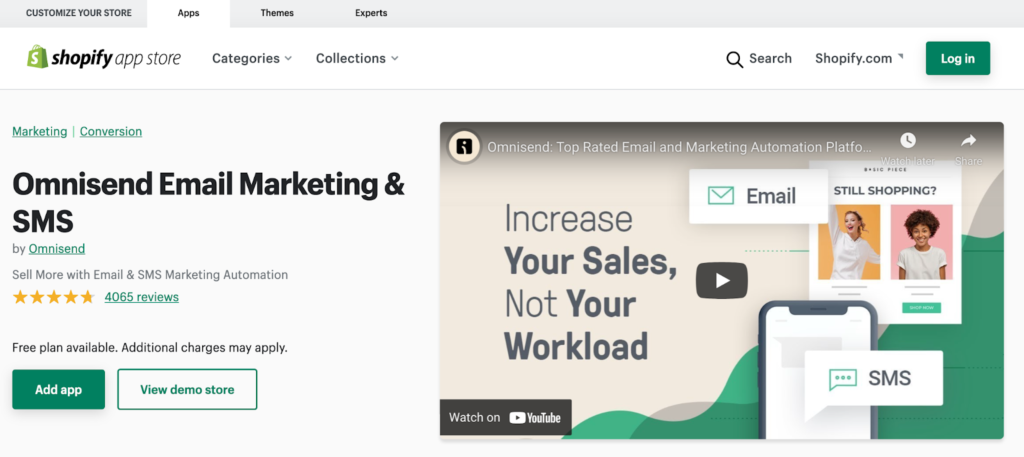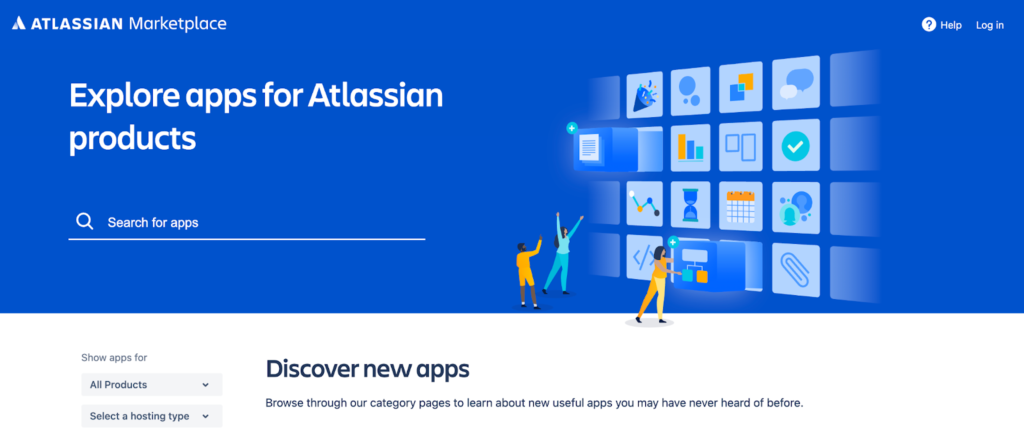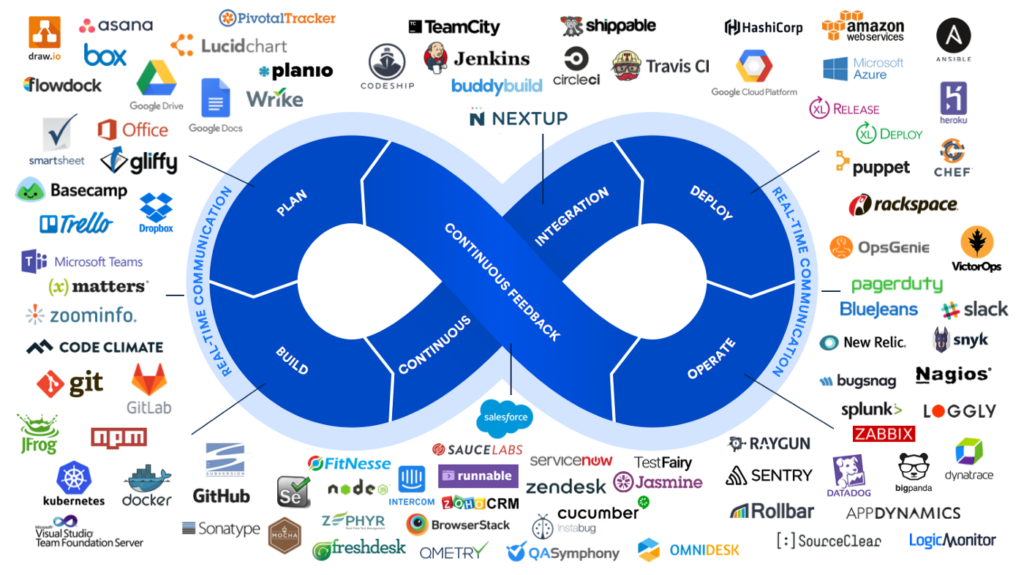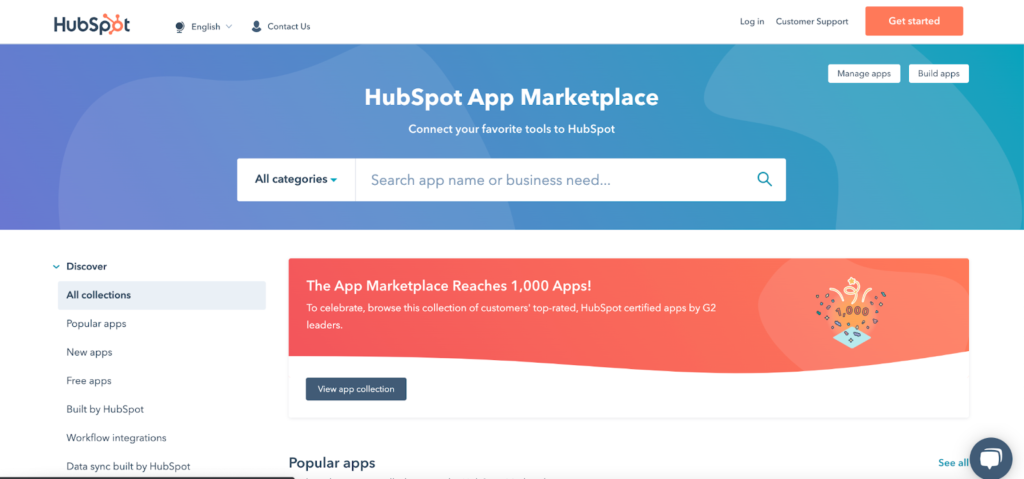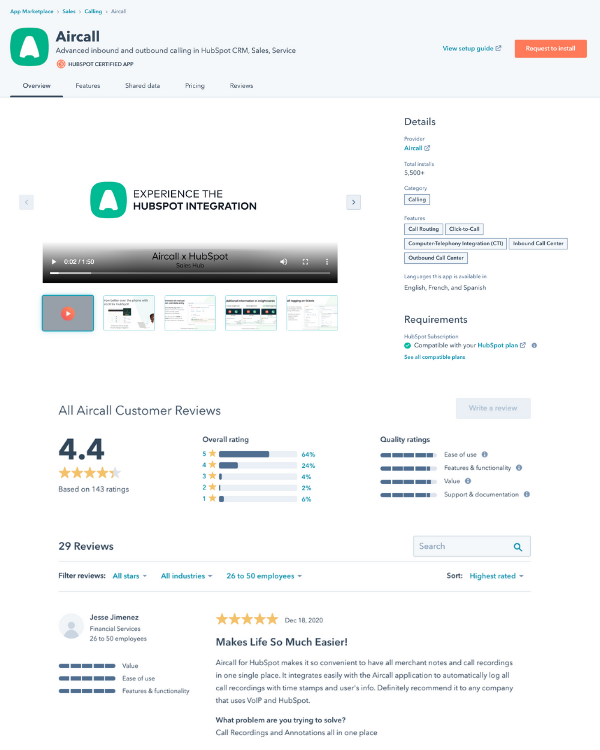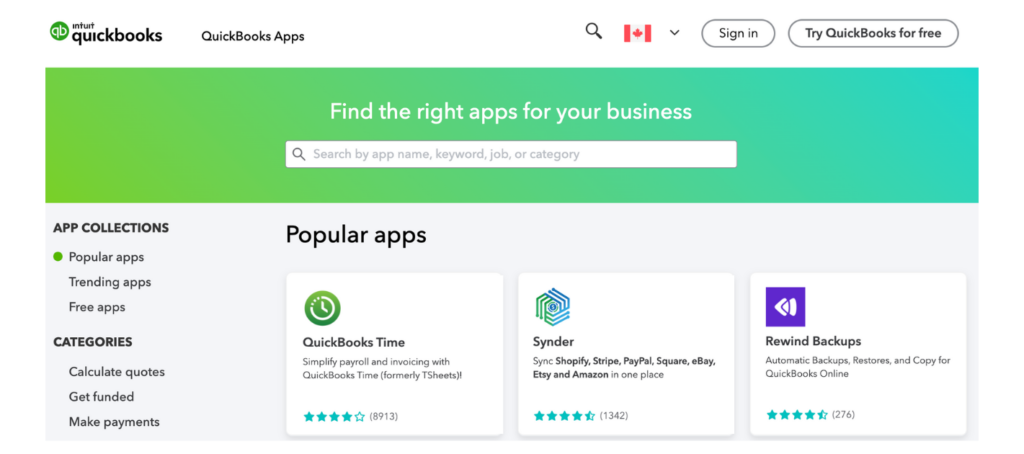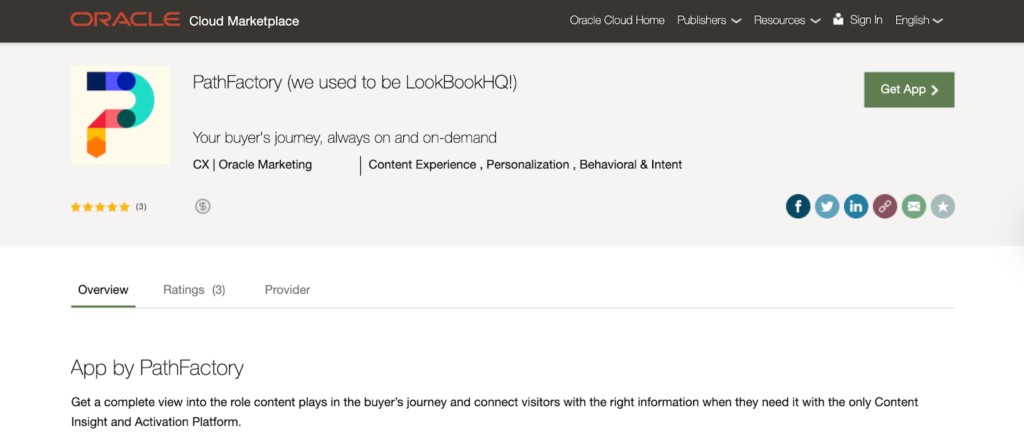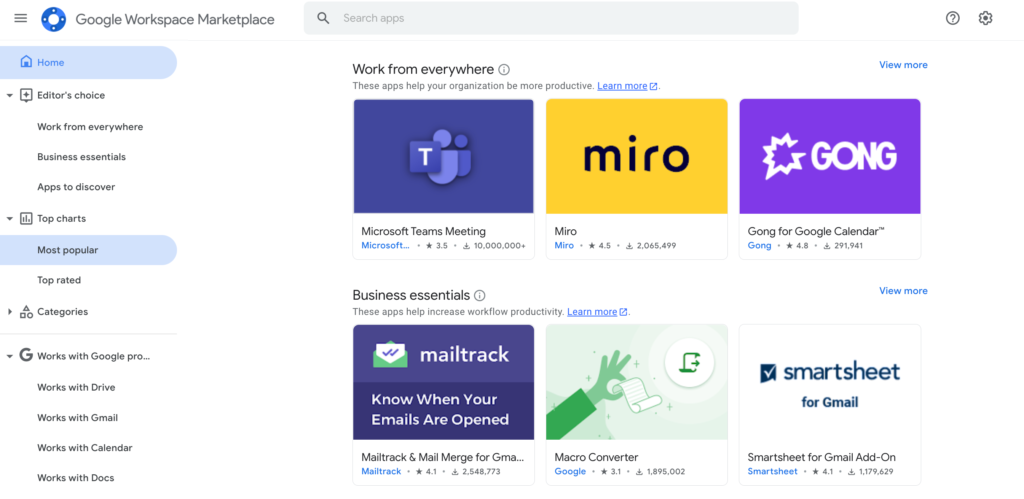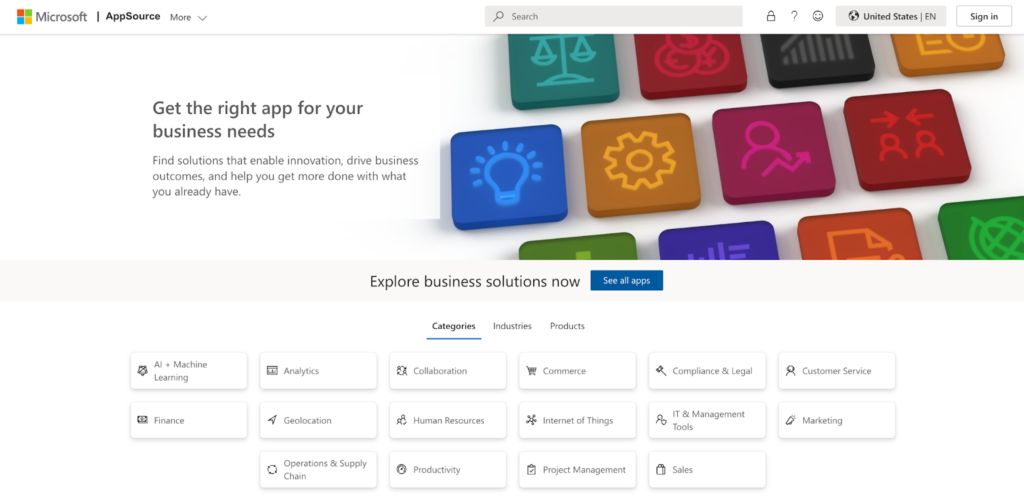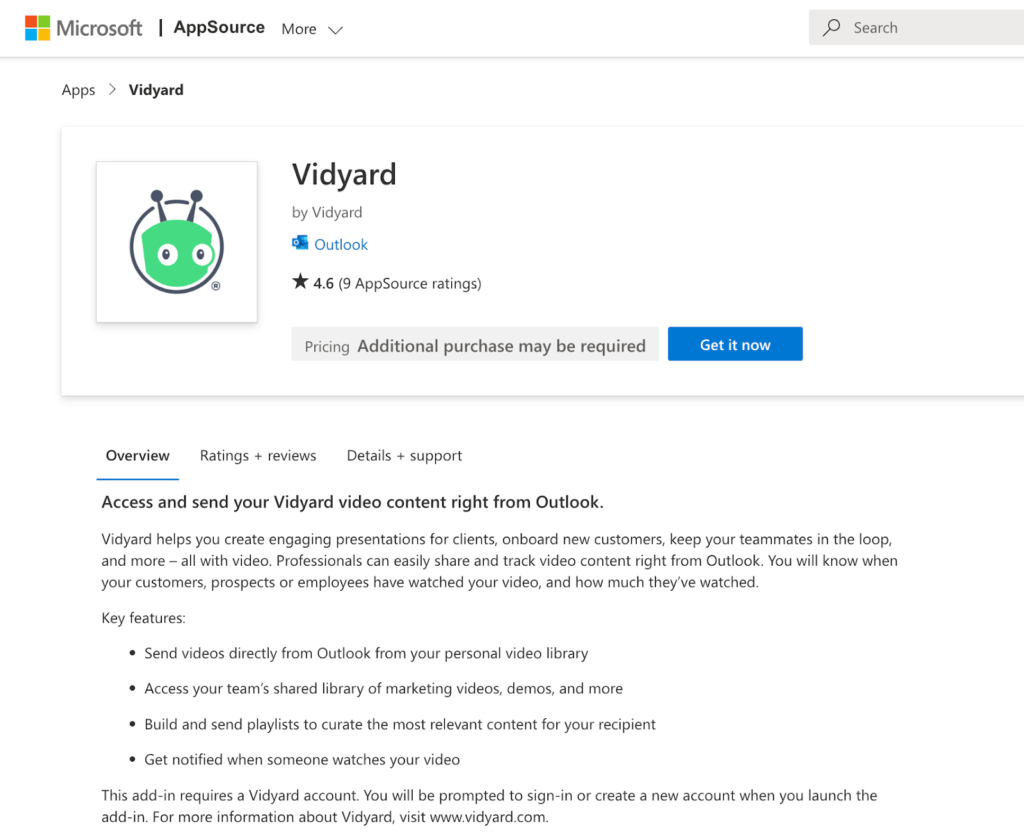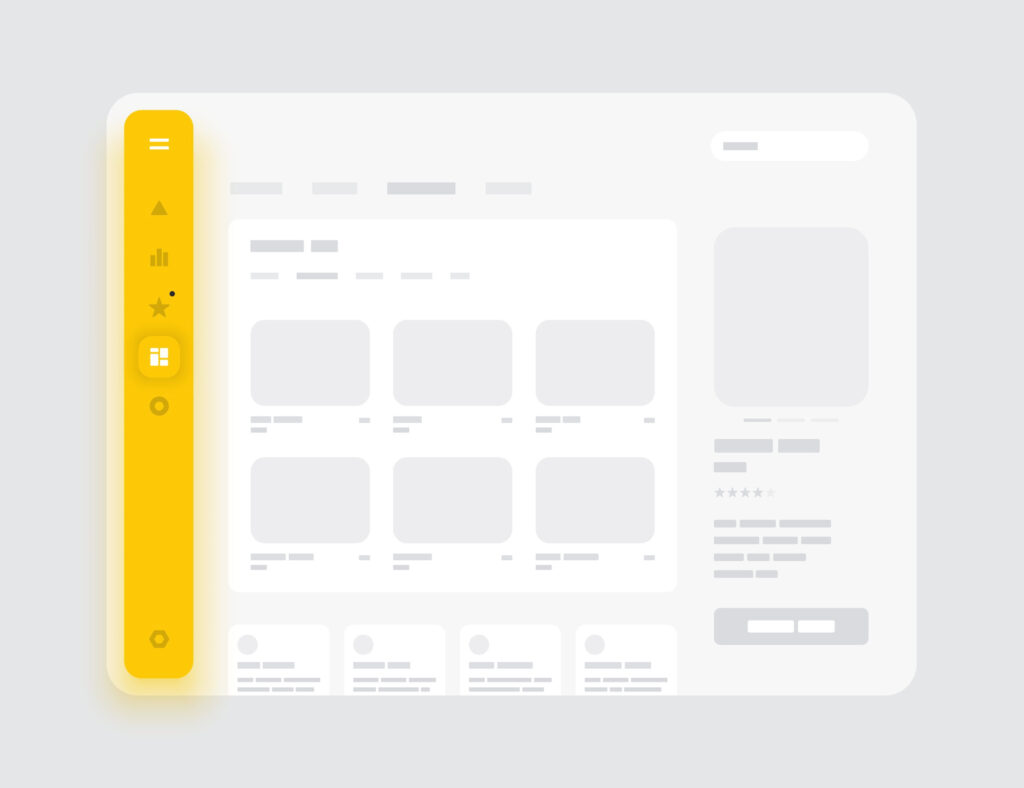B2B SaaS buyers are increasingly turning to app marketplaces. As vendors set up app marketplaces to meet this demand, roughly 30% use reviews as social proof on app marketplace listings to encourage more app installs. In part 1 of a 4-part ultimate guide to B2B tech marketplaces and reviews, learn why app marketplaces are going mainstream, how reviews play an important role in this buying channel, and what B2B SaaS vendors are already onboard with reviews in their marketplace — with 40 examples.
Table of Contents
What do Shopify, Salesforce, and HubSpot have in common?
They each have a thriving app marketplace. As B2B SaaS users adopt more apps, so does their need to find, select, and integrate the right ones. When software buyers make these decisions, they don’t want to choose between an all-in-one solution or multiple siloed best-of-breed solutions — they want a best-of-breed platform that they can easily extend with best-of-breed apps.
That’s where app marketplaces come in.
But what exactly is a B2B app marketplace? Why are they so popular among software professionals? And how do reviews fit into app marketplaces?
In this ultimate guide to B2B app marketplaces, we’ll answer all those questions and more. So if you want to learn more about this growing trend in B2B SaaS, read on.
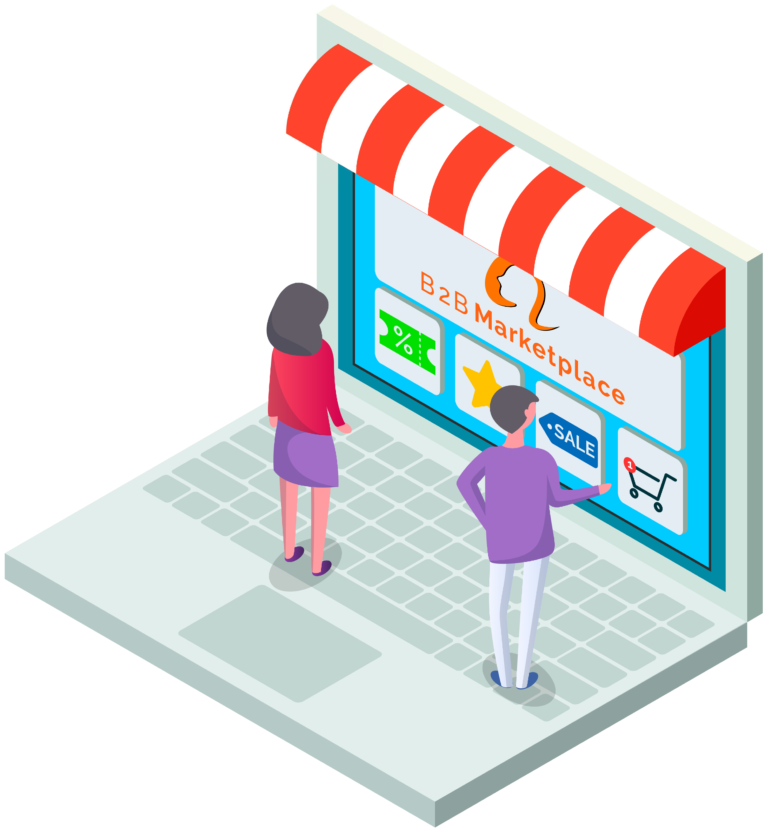
What is an App Marketplace?
AppDirect defines an application marketplace as “an online store where customers can go to find and purchase applications.” App marketplaces provide a platform for companies to showcase their products and services to potential partners.
They also offer a place for partners to connect and build relationships and can help companies develop strong B2B ecosystems by creating an environment conducive to partner collaboration.
App marketplaces are one type of marketplace in B2B tech. The other main type of marketplace is cloud marketplaces, which are dominated by the big three: AWS Marketplace, Microsoft Azure Marketplace, and Google Cloud Marketplace. By 2025, Canalys forecasts that US$25 billion of sales will flow annually through these cloud marketplaces — 59% CAGR from 2020.
A helpful way to understand the range of B2B tech marketplaces is by considering Scott Brinker’s layers of technology in the cloud. Brinker is the Editor of chiefmartec.com — maker of the well-known annual MarTech landscape visualization — and the VP of Platform Ecosystem at HubSpot. In his session at the Ecosystem Week 2022 event, he walked through this diagram of the layers of technology.
It’s at the App Platform layer that we find app marketplaces. As Brinker said in his session, “what’s interesting about these app platforms is that all of them now have open APIs and are creating marketplace ecosystems around them.”
According to a Bill Gates quote in The Partner Hacker Handbook, a platform works “when the economic value of everybody that uses it, exceeds the value of the company that creates it. Then it’s a platform.” App marketplaces help create more economic value beyond what the company creates by enabling partners to add value to core app.
App marketplaces are one of a dozen categories of ecosystem technology. According to leading partnerships analyst Jay McBain of Canalys, Ecosystem marketplace and integration technology “assists in marketplace deployment, storefront customization, API integration and listing support, among other aspects, to streamline the workflows of all stakeholders.”
These app marketplaces are an increasingly popular channel for B2B SaaS buyers.
Why are app marketplaces important?
Buyers are quickly and increasingly buying software through app marketplaces.
In 2021, G2 also found that 1 in 5 buyers prefers to buy software from a third party. With the rise of third-party marketplaces, more and more B2B SaaS vendors are investing in ecosystems to make the software buying process more frictionless.
By the 2022 buyer behavior study, G2 found that buyers increasingly look beyond buying indirectly. While the number of buyers who prefer buying directly from vendors is down 9%, third-party marketplaces are up 6%, and value-added resellers have increased by 4%.
The net result: 40% of today’s B2B buyers prefer to go indirect.
The growth in marketplaces isn’t limited to experienced buyers having a preference for indirect — it’s also coming from a surge in first-time marketplace buyers.
Tackle.io found a significant increase in the percentage of buyers who have purchased software through a cloud marketplace: from only 22% in 2020 to 61% in 2021 — nearly 3x as many cloud marketplace place buyers as just one year ago.
Going back to Scott Brinker’s presentation at Ecosystem Week 2022, he described how the consolidation of cloud Infrastructure-as-a-Service (IaaS) providers is leading to, among other things, increased use of app marketplaces:
"The wild thing is that because these (IaaS) platforms enable developers to build more…the more consolidation there is at the bottom of the stack, the greater diversification we see at the top of the stack…the platforms actually facilitate the development of more specialist apps…these platforms tend to have a fair amount of reach from a distribution perspective…their ability to offer things like marketplaces to help their audiences discover and integrate specialist apps provides a channel for the specialist apps as well.”
For example, here is how SEMRush (SEMR) explained in its Q3 2022 Earnings Call Transcript how its app marketplace is central to the company’s growth strategy:
"We leverage success in SEO to expand into new categories such as competitive intelligence, digital PR, content creation, and other areas primarily through internal R&D. As we look ahead, the use cases continued to expand but extremely not feasible or practical for Semrush to build solutions for all the different use cases internally as our R&D resources would need to expand exponentially. And thereby, limit our ability to invest elsewhere. This is the crux of our App Center strategy to address the fragment market including many niche use cases which seek to offer a wide variety of product capabilities without overwhelming the capacity of our internal development. To solve this, we intend to offer third party applications that address customer needs in instances where the third party solution has a wide adoption and we have decided not to build internally. Over the long term, we believe a substantial portion of Semrush revenue will be driven by products created by partners but are only made possible by the Semrush platform. Another promising feature of the App Center model is the potential to monetize free active users. As many of you know, we have a large and growing cohort of free active users on the platform. These users may have very modest requirements and the full functionality of the entry level program may be overkill for their needs. They may be interested in limited functionality offered by a lower priced app with the possibility to trade up to Semrush subscription in the future as their use cases expand. As we continue to grow the Semrush platform, I believe partners, whether they be third-party developers or leading companies like Wix will increasingly see value in collaborating with Semrush. The App Center is central to our wide platform strategy. A strategy that I believe will lay the foundation for our growth well into the future."
Eugene Levin, President of SEMRush (SEMR). Excerpt from a transcript of the Q3 2022 SEMRush Earnings Call Transcript, on how the SEMRush app marketplace is central to the company's growth strategy.
The buyer behaviour trend is clear: more apps are being bought indirectly on app marketplaces. The question becomes, what’s a B2B vendor to do?
How-to app marketplace for B2B companies
B2B SaaS vendors can meet the buyer demand for app marketplaces by creating their app marketplace, tapping into other marketplaces, or both.
Many B2B SaaS vendors are already tapping into other marketplaces. Today, almost half of the Forbes’ Cloud 100 actively sell on at least one of the three leading Cloud Marketplaces (Amazon’s AWS Marketplace, Microsoft’s Azure Marketplace, and Google’s GCP Marketplace), according to Tackle.io.
After reviewing 200 B2B SaaS companies — on the Forbes Cloud 100 Private 2022 and Mike Sonders’ 100 Largest Public SaaS Companies in the U.S. — I found:
- 85% of B2B SaaS companies have a tech integrations page – a step toward an app marketplace
- 49% have an App Marketplace or App Store
The first course of action for short-term results is typically tapping into third-party app marketplaces. Then it’s time for the longer-term, potentially higher pay-off investment into a first-party app marketplace — an app marketplace of your own.
The three tech behemoths aren’t the only ones with marketplaces. 82% of the 50 largest publicly traded B2B SaaS companies in the US and 41% of the Forbes Cloud 100 now have a marketplace (see the raw data on the Forbes Cloud100 rate of partner pages, app marketplaces, and use of reviews in app marketplaces.)
With Tackle.io predicting that more new and niche marketplaces will come online, we’re likely to see many more app marketplaces.
Let’s look at a B2B SaaS company that’s done both – tapped into other marketplaces and made an app marketplace of its own.
Aircall: B2B SaaS App Marketplace Example
Aircall, a B2B cloud-based phone system provider, has created an app marketplace and tapped into others.
It’s listed in multiple third-party app marketplaces, like the HubSpot App Marketplace, the Salesforce AppExchange, and the Zendesk Marketplace.
By listing in the partner ecosystems of larger companies, Aircall extends its reach while extending the product functionality of its partner’s platform. For example, by teaming up with HubSpot, Aircall gets promotional support from HubSpot, as you can see in this tweet by Scott Brinker, VP Platform Ecosystem at HubSpot and Editor at chiefmartec.com:
Ecosystems = Growing Better Together.@Aircall and @HubSpot are teaming up to offer businesses custom expert guidance and exclusive discounts on software.
— Scott Brinker (@chiefmartec) October 13, 2022
Learn more about our partnership, and how we’re empowering businesses to grow better: https://t.co/L3Z7n5arqQ #martech
By listing in the HubSpot App Marketplace, Aircall gains a valuable distribution channel to many prospective buyers while making it easy for existing Aircall and HubSpot customers to integrate the solutions.
As you can see in the image below, the Aircall HubSpot app has been installed over 7,500 times.
Aircall also built a thriving app marketplace of over 100 apps. It defines an online app marketplace as a place that “brings all compatible software together—complete with descriptions and reviews—to help customers, prospects, teammates, and product partners alike benefit from SaaS integrations.” And while they rightly say that it takes effort and a long-term view to set up an app marketplace, there’s a sustainable and high-reward pay-off if you do it right.
Aircall is not the only company to see the value in an app marketplace. Many B2B software providers now offer app marketplaces to give customers more choices and flexibility, each with its unique focus and offerings. A common goal is to increase app marketplace installs to extend the value of your platform and, in turn, retain more customers while providing them with more value.One of the levers to pull to get more app installs is to leverage social proof. While social proof can be expressed in several ways — downloads or installs, “loved by” or “editor’s choice” — reviews are the most powerful form.
Reviews and B2B App Marketplaces
The bigger the company, the more likely it will have an app marketplace and leverage reviews.
The appeal of app marketplaces tends to grow with company size because of network efforts. As Venture Capitalist Andrew Chen said in his book, The Cold Start Problem: How to Start and Scale Network Effects:
"When more sellers are part of a marketplace, there's more selection, availability, and comprehensive reviews/ratings—meaning people are more likely to find what they want, and each session is more likely to convert into a purchase." - Andrew Chen, Venture Capitalist at Andreessen Horowitz. Excerpt from The Cold Start Problem.
Bigger companies can attract more sellers to list in their marketplace, which attracts more buyers. We can see how company size correlates with app marketplaces:
- 100% of the biggest three companies with B2B marketplaces — Amazon (AWS), Microsoft, and Google* — leverage reviews. These are trillion-dollar companies with billions of dollars flowing through their app marketplaces annually. *Note that Google Cloud Marketplace does not use reviews; Google Workspace Marketplace does use reviews.
- 70% of the next ten largest B2B tech companies also leverage reviews in their marketplaces. Think Abobe, Oracle, Salesforce, and Intuit.
- 30% of B2B marketplaces leverage reviews (random selection of 150 app marketplaces of all sizes).
The research on the number of B2B app marketplaces that leverage reviews was inspired by the 2019 work of Clement Vouillon of Point Nine Capital, who mapped a landscape of 50 B2B SaaS app stores and found that 26% of them used user reviews. I looked through these app stores again in October 2022 and found that the number of B2B SaaS app stores with user reviews climbed to 32%.
To build on this sample of B2B SaaS app marketplaces, I also looked through the app marketplaces of the 50 Biggest Public SaaS Companies in the U.S by Mike Sonders and found that roughly 30% of them use reviews in their app listings.
The companies on the Forbes Cloud 100 aren’t using reviews in their app marketplace as much. However, G2 and Tackle.io found that almost half of the companies on this list actively sell on at least one of the three leading Cloud Marketplaces (Amazon’s AWS Marketplace, Microsoft’s Azure Marketplace, Google’s GCP Marketplace). Given that tapping into other marketplaces can be a precursor to investing more in a marketplace of one’s own, we may see more of them invest in their own app marketplaces by adding reviews as social proof.
Dozens of B2B SaaS companies have made app marketplaces that leverage reviews. Here are 40 examples:
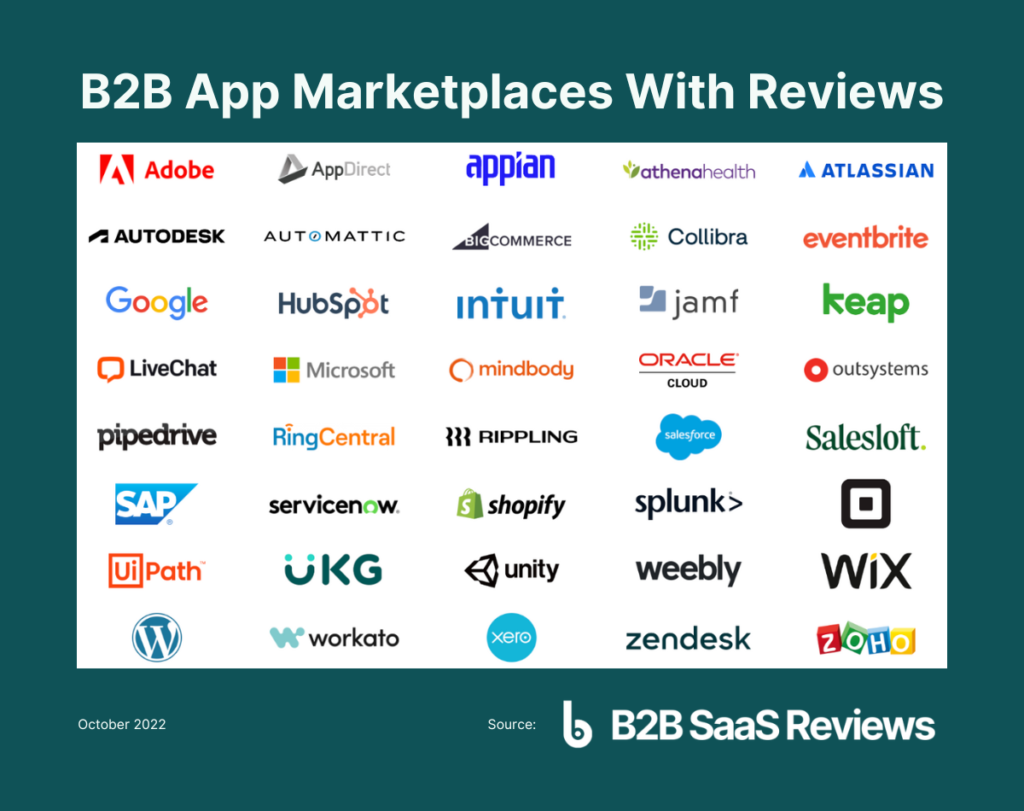
40 B2B App Marketplaces With Reviews
Here are 40 B2B tech companies that have an app marketplace with reviews:
Adobe Exchange is a marketplace for creative tools and services. It offers apps for graphic design, video editing, web development, and more. |
The Athenahealth Marketplace is an online platform for healthcare providers to purchase products and services that complement their existing technology systems. This includes solutions for practice management, patient engagement, population health, and more. |
AppDirect Marketplace is a marketplace for cloud-based applications. It offers a wide range of apps from a variety of developers, all designed to help businesses grow. |
The Appian App Market offers a wide range of pre-built applications and integrations. Apps can be filtered by Appian Staff Picks, Award Winners, and more. |
The Atlassian marketplace is a marketplace for development tools and services. It offers apps for project management, code collaboration, and more. |
The Autodesk app store is a platform for developers to showcase and sell their software integrations with Autodesk products to “easily extend the power of Autodesk software using apps created for the end user community.” |
Automattic is the owner of the popular content management system, WordPress. Calling its apps “plugins,” WordPress offers countless plugins to enhance a website. There is a plugin for nearly every aspect of managing a website, from SEO optimization to security measures. |
The BigCommerce app store offers over 200 apps to enhance and improve your BigCmmerce store. From email marketing automation to inventory management, these apps can take your eCommerce business to the next level. |
The Collibra Marketplace is a one-stop shop for data governance solutions. Users can browse and purchase products from third-party providers, as well as Collibra’s own offerings. |
The Eventbrite app marketplace allows event organizers to easily browse and purchase apps that can enhance their event experience. Popular options include ticketing, check-in, and surveying apps. |
The Google Workspace Marketplace offers a variety of third-party apps and add-ons that can enhance your productivity and collaboration within Google Workspace (formerly known as G Suite). These apps cover a range of categories including project management, customer relationship management, business intelligence, communications, and more. |
The HubSpot App Marketplace is a collection of integrations with third-party tools and software that can be easily connected to your HubSpot account. These apps cover a wide range of functions, from email marketing and lead generation to website analytics and customer support. |
The QuickBooks App Marketplace offers a variety of apps that can integrate with your QuickBooks software to enhance and streamline various aspects of running a business, such as payroll, inventory management, e-commerce, and more. |
The Jamf Marketplace is a platform for third-party developers to offer their apps, integrations, and consulting services for the Jamf Pro management software. |
The Keap Marketplace is a marketplace for sales and marketing applications. It offers apps for customer relationship management, email marketing, and more. |
The LiveChat Marketplace offers app integrations with popular CRM and messaging platforms, making it easy to streamline communication with customers. |
Microsoft AppSource is a marketplace for business applications. It offers apps for accounting, CRM, project management, and more. |
The MindBody Partner Store offers a variety of apps to enhance and streamline the operations of your wellness business |
The Oracle Cloud Marketplace is a one-stop shop for Oracle customers looking for cloud solutions. It offers a variety of apps, including those for business intelligence, customer experience management, and human capital management. |
The OutSystems Forge Community is a platform where developers can share and download apps, modules, extensions, and other resources for OutSystems’ low-code development platform. |
The Pipedrive Marketplace is a marketplace for sales applications. It offers apps for customer relationship management, lead generation, and more. |
The RingCentral App Gallery is a collection of integrated business apps that enhance productivity by streamlining communication and collaboration within teams. |
The App Shop by Rippling has a wide range of apps to help simplify HR, IT, and Finance. |
The SAP App Center is a marketplace for business applications. It offers apps for accounting, CRM, project management, and more. |
The Salesforce AppExchange is a platform for businesses to find, purchase, and implement third-party applications that integrate with their Salesforce systems. These apps can range from marketing automation to HR management, and allow companies to customize their Salesforce setup to fit their specific needs. |
The Salesloft Marketplace offers over 100 apps to improve sales outreach. Salesloft uses G2 star ratings for the apps listed in its marketplace. |
The ServiceNow store offers a variety of ready-to-use applications and integrations that can be easily added to your ServiceNow platform. The store not only helps streamline processes and improve productivity. |
The Shopify app store offers a variety of tools and resources for businesses to improve their online presence. With over 6,000 apps available, there are apps for marketing, social media management, customer support, shipping, and more. |
Splunkbase is a marketplace where users can go to find various apps, add-ons, and solutions that extend the functionality of their Splunk software. This platform allows developers to share their creations with the community, while also providing a way for users to review and rate these offerings. |
The Square App Marketplace offers a variety of apps designed to enhance and streamline the process of running a small business. These apps cover various aspects such as employee management, inventory tracking, customer loyalty programs, and more. |
The UiPath Marketplace is an online platform where users can find and purchase pre-built robotic process automation (RPAs) that extend the UiPath Platform. These RPAs can automate tasks in various industries, such as finance, healthcare, government, and retail. |
The UKG Marketplace, also known as Ultimate Kronos Group Marketplace, is an online platform where HR professionals and business leaders can access HR technology solutions from leading vendors. These solutions include benefits administration, payroll, time and attendance management, talent management, and more. |
The Unity Asset Store, available within the Unity game engine, is a marketplace for developers to buy and sell various assets, including 3D models, sound effects, animations, and entire project templates. |
The Weebly App Center offers a variety of powerful tools and integrations to enhance your website. With over 200 apps available, you can easily add features such as contact forms, live chat, social media feeds, and eCommerce functionality. |
The Wix App Market offers a wide range of applications and features to enhance your website experience. With options ranging from contact forms to online booking systems, the Wix App Market has something for every type of website. |
The WordPress Plugins Marketplace has over 60,000 plugins to extend to WordPress content management system. |
Workato has extensive app integrations that allow seamless data transfer and communication between various platforms. |
Xero Marketplace is a marketplace for accounting and financial applications. It offers apps for invoicing, payroll, and more. |
The Zendesk Marketplace is a marketplace for customer service applications. It offers apps for live chat, knowledge management, and more. |
Zoho Marketplace is a marketplace for business applications. It offers apps for accounting, CRM, project management, and more. |
Zooming out to look at the B2B SaaS app marketplace landscape, there are over 100 today.
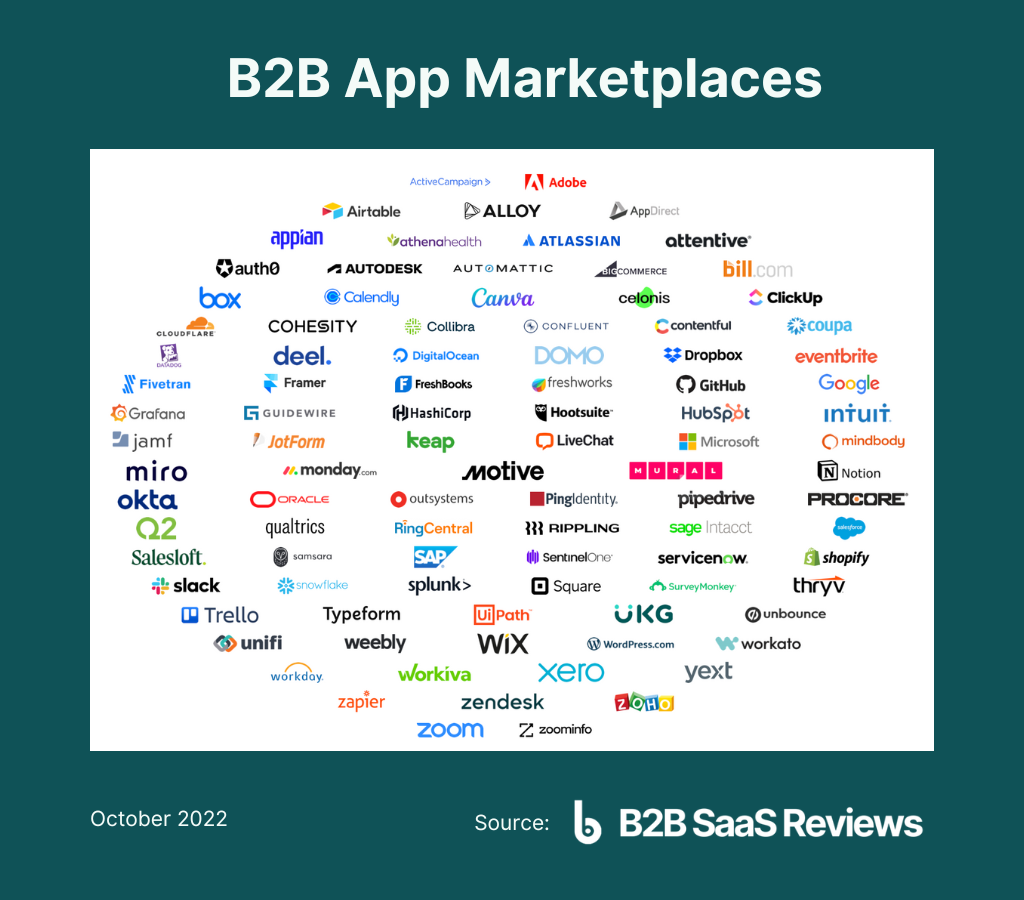
8 Examples of Reviews in B2B App Marketplaces
Salesforce AppExchange
The Salesforce AppExchange is a marketplace for sales, marketing, and service cloud applications. It offers a wide range of apps from a variety of developers, all designed to help businesses grow.
The AppExchange displays reviews and ratings on category and product pages on the AppExchange, as you can see in these examples.
Shopify App Store
The Shopify App Store is a marketplace for e-commerce applications. It offers apps for accounting, marketing, shipping, and more. It’s a fast-growing app store, jumping from 3,200 apps in 2020 to over 6,000 apps in 2021, according to TechCrunch.
Reviews are featured prominently on App listings, as seen in this example of the Omnisend listing.
Atlassian marketplace
Atlassian marketplace is a marketplace for development tools and services. It offers apps for project management, code collaboration, and more and is an excellent resource for developers of all levels. Whether you’re just starting with development or a seasoned pro, there’s an app in the Atlassian Marketplace to help you get the job done.
Atlassian recommends the following to vendors looking to convert more from trying to buying in the Atlassian marketplace by paying attention to reviews:
Users can rate each app in the Marketplace from 1 to 4 stars. It’s important to stay on top of your ratings, as they are one of the first things users see when looking at an app listing.
If you are just getting started and don’t have any ratings, start by encouraging your first few users to rate your app. The more ratings you have, the more trust users will have in the overall rating of your app.
Sometimes users will provide specific feedback in those reviews. Take them into consideration and make improvements to your app accordingly. If users see that their concerns are being addressed, your ratings are more likely to go up.
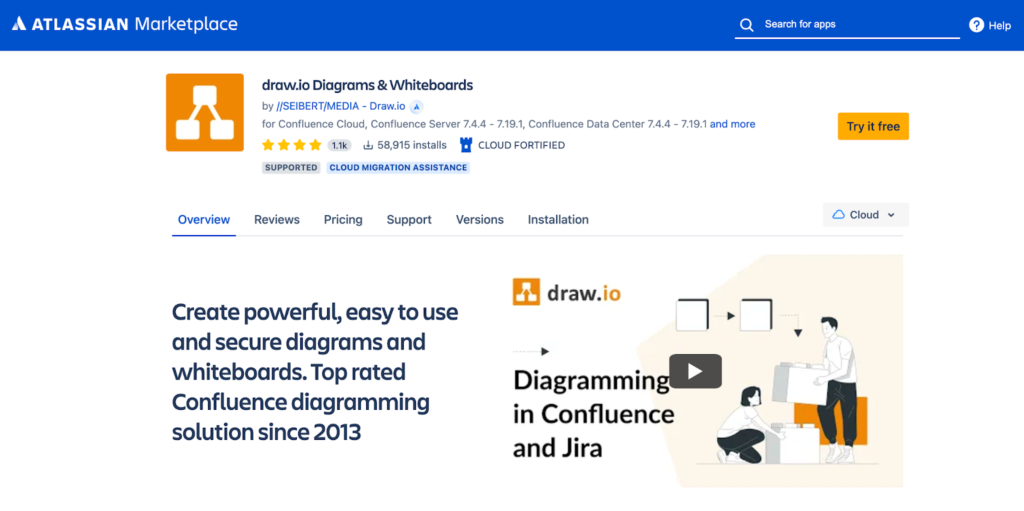
The Atlassian Marketplace alone recently passed $1 billion in lifetime sales. According to Atlassian, “More than 60% of our customers use at least one app or integration from the Marketplace, and as we look towards our largest customers, that number is well over 80%”.
Atlassian has written about 3 ways a partner ecosystem helps your SaaS business grow.
HubSpot App Marketplace
The HubSpot App Marketplace has marketing, sales, and service applications designed to help businesses grow.
To celebrate the HubSpot App Marketplace reaching 1,000 apps, HubSpot created a curated collection of HubSpot-certified apps by G2 leaders.
HubSpot features reviews on app listings, such as in this example with Aircall.
QuickBooks App Store
The QuickBooks App Store is a marketplace for accounting and financial applications. From invoicing to payroll, there are numerous options available to help streamline your business operations.
Apps are reviewed and rated by users, making it easy to decide which ones will work best for your company.
Oracle Cloud Marketplace
The Oracle Cloud Marketplace is a one-stop shop for Oracle customers looking for cloud solutions. It offers a variety of apps, including those for business intelligence, customer experience management, and human capital management.
Oracle displays reviews and ratings on app listings, as seen in this PathFactory example.
Google Workspace Marketplace
Google Workspace Marketplace, not to be confused with the Google Cloud Platform Marketplace, was started in 2010 as the Google Apps Marketplace. It provides Google users with a single, unified experience.
While Google Cloud Platform Marketplace does not use reviews, Google Workspace Marketplace does, as you can see in these screenshots.
Microsoft AppSource
Microsoft AppSource is a marketplace for business applications. It offers apps for accounting, CRM, project management, marketing and more.
Buyers can find reviews and ratings on app listings, such as in the Vidyard example below.
Conclusion of Part 1
App marketplaces offer many benefits, including trying out new software without committing to a long-term contract, comparing different products side-by-side, and accessing all your software in one place.
If you’re considering investing in a B2B app marketplace, check out these app marketplace examples shared above. With so many B2B app marketplace examples available, you’re sure to find one to inspire a marketplace of your own.
In part 2 of 4 of this guide, we’ll do a deep dive of five major app marketplaces in B2B.
Author
-

I'm the Founder and Editor-In-Chief of B2B SaaS Reviews and the Director of Demand Generation at PartnerStack, the leading platform for partner management and affiliate marketing in B2B SaaS. My experience spans several notable B2B SaaS companies, including Influitive (Advocate Marketing), LevelJump (Sales Enablement, acquired by Salesforce), and Eloqua (Marketing Automation, acquired by Oracle). I hold a Bachelor of Commerce in Marketing Management from Toronto Metropolitan University and a Master of International Business from Queen's University, with academic exchanges at Copenhagen Business School and Bocconi University.

